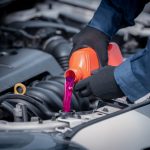Why Does The PH Level Of Your Coolant Matter?
November 29, 2023 4:46 pm When it comes to maintaining the health and performance of your vehicle’s engine, paying attention to the coolant’s pH level is vital. The pH level of your coolant directly affects the effectiveness of your cooling system, preventing corrosion and avoiding costly repairs. This blog post explores the significance of maintaining the proper pH level in your coolant and the consequences of neglecting this essential aspect of vehicle maintenance.
When it comes to maintaining the health and performance of your vehicle’s engine, paying attention to the coolant’s pH level is vital. The pH level of your coolant directly affects the effectiveness of your cooling system, preventing corrosion and avoiding costly repairs. This blog post explores the significance of maintaining the proper pH level in your coolant and the consequences of neglecting this essential aspect of vehicle maintenance.
Understanding pH Level in Coolant:
1. What is pH?
The pH scale measures the acidity or alkalinity of a substance. The scale ranges from 0 to 14, where 0 is highly acidic, 7 is neutral, and 14 is highly alkaline. Maintaining the correct pH level in your coolant is crucial for achieving optimal engine performance and longevity.
2. The Ideal pH Level for Coolant:
For most vehicles, the ideal pH level for coolant falls between 8.5 and 10.5. This slightly alkaline range helps to prevent metal corrosion within the cooling system. When the coolant’s pH is within the proper range, it creates an environment that protects the engine from rust, scale buildup, and corrosion, ensuring smooth operation and extending the lifespan of your vehicle.
Consequences of Low pH in Coolant:
1. Corrosion and Rust:
If the pH level of your coolant drops below the recommended range, the cooling system becomes more acidic. This acidic environment can lead to corrosion and rusting of metal components, such as the radiator, water pump, and heater core. Corrosion compromises the structural integrity of these parts, potentially leading to coolant leaks, engine overheating, or even engine failure.
2. Scale and Deposits:
When the coolant’s pH level is too low, it promotes the formation of scale and mineral deposits within the cooling system. These deposits can clog radiator channels, restrict coolant flow, and impede heat transfer. As a result, the engine may overheat, leading to potential damage to the cylinder head gasket, pistons, or even the engine block.
Consequences of High pH in Coolant:
1. Alkaline Scaling:
While low pH levels are more commonly known to cause issues, excessively high pH levels in the coolant can also be detrimental to your engine’s health. High pH, or alkaline scaling, can cause mineral deposits, especially of calcium carbonate, to build up inside the cooling system. These deposits hinder heat transfer, potentially leading to inefficient cooling and engine overheating.
2. Cooling System Blockage:
Alkaline scaling can form blockages within the coolant passages and heat exchangers, hindering the system’s ability to cool the engine effectively. The restricted flow of coolant impairs temperature regulation, increasing the risk of engine overheating and engine component damage.
Maintaining Proper pH Level:
1. Regular Coolant Inspections and Flushing:
To ensure the optimal pH level of your coolant, regular inspections and flushing are essential. Follow the manufacturer’s guidelines for coolant replacement intervals and ensure that the new coolant is compatible with your vehicle’s system. Regular flushing removes any contaminants and maintains the proper coolant pH level, protecting your engine from corrosion and deposits.
2. Use pH Testing Strips:
Using pH testing strips specifically designed for coolant can help you monitor the pH level accurately. Simply dip the strip into the coolant and compare the color with the provided pH chart. This simple test can indicate if the coolant is within the recommended pH range or if it requires adjustment or replacement.
Summary:
Maintaining the proper pH level in your coolant is crucial for the health and longevity of your vehicle’s engine. Whether the pH level is too low or too high, it can lead to various issues, including corrosion, rust, scale, and cooling system blockages. Regular coolant inspections and proper maintenance, including flushing and pH level monitoring, are necessary to ensure the optimal performance of your cooling system. By paying attention to the pH level of your coolant, you can proactively protect your engine from costly damage and enjoy a vehicle that runs smoothly and reliably for years to come.
Need an Automotive Repair Shop in Madison, TN?
We have the best in certified mechanics that offer great repairs on engines, transmissions, electrical systems, and so much more! Along with general and complete auto repair and maintenance, we also specialize in performance! There is nothing like feeling the road peel away from under your tires, and we offer performance tune-ups, custom exhaust upgrades, computer diagnostics and enhancements, OEM part installations, and more! Call us today or come in for auto repair or performance enhancements! Our expert mechanics will make sure you are in good hands, and will not only get you back on the road, but will also add a few more horses under the hood.
Categorised in: Coolant, Cooling System
This post was written by admin

Comments are closed here.